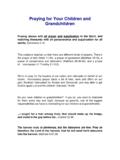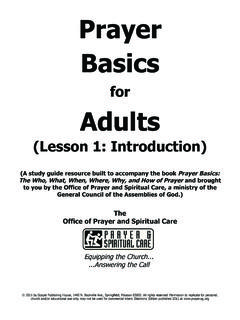Transcription of Spiritual Direction For Adult Children Of Alcoholics
1 & schedule of Margaret Bullitt-Jonas the Rev. Margaret Bullitt-Jonas, 1991 (reprint by written permission only) Spiritual Direction For Adult Children Of Alcoholics - Spiritual Direction For Adult Children Of Alcoholics Spiritual Direction For Adult Children Of AlcoholicsSpiritual Direction respects the unique character, situation, and needs of each person. Every one of us travels his or her own particular and unique journey home to God, and good Spiritual Direction willingly embraces the fact that the wind blows where it will. Because the Holy Spirit works freely in every person, the Spiritual director must be open to the unexpected, sensitive to surprise, and ready to relinquish any preconceived notions about how a person might fit into this or that category, this or that model of Spiritual development. At the same time, it has been my experience that the process of Spiritual Direction is strengthened and enriched if the director has a basic understanding of the emotional effects of growing up in a family troubled by such dys-functions as alcoholism, addiction, and physical or sexual abuse.
2 Although each person is unique, adults who are recovering from the pain and damage caused by growing up in a dysfunctional family do tend to share characteristic emotional problems that can affect their capacity and their inclination to pray, their images of God, and their relationship to the divine. I am convinced that the more clearly a Spiritual director understands the emotional difficulties that tend to plague those who grew up in dysfunctional families, the more discerning and effective the director can be in guiding such persons toward Spiritual growth and wholeness. In recent years, mental health professionals have begun to focus on the unique constellation of emotional problems that characterize Adult Children of Alcoholics (ACOAs)--persons who grew up in a family in which one or both of the parents were alcoholic. In The Addictive Organization, Anne Wilson Schaef and Diane Fassel define an alcoholic family in more general terms, as a fam-ily that repeats alcoholic or addictive patterns.
3 It has been estimated that in the United States, as many as 28 to 34 million people, or 15 percent of the population, are ACOAs, though Schaef and Fassel believe that even this estimate is too low. What s more, persons who did not grow up with an alcoholic parent but whose grandparent, spouse, or love partner is chemically addicted suffer from many of the same dysfunctional patterns of thinking and behavior that characterize ACOAs. These so-called co-dependents represent an even larger percentage of the American population. Obviously, the problem of growing up with or living in a close relationship with an addicted person is one that permeates our society. Many of those seeking Spiritual Direction today are strug-gling to recover from the Spiritual damage that addiction inflicts on the human psyche and My own interest in discovering what hinders or helps an ACOA to grow spiritually comes not only from the ACOAs to whom I ve offered Spiritual Direction but also from my own personal experience of growing up with an alcoholic parent.
4 Both as director and directee, I have come to respect the power of the emotional patterns that haunt ACOAs and block their relationship to God. For example, ACOAs may be obsessed with control and the fear of being out of control. ACOAs Margaret Bullitt-Jonas, 1991 - 3 usually find it difficult to trust either themselves or other people, and tend to avoid experiencing or expressing their feelings. ACOAs also tend to ignore their own personal needs, to fear criticism and conflict, and to dread abandonment. The list goes on. In different ways, each of these patterns can distort or dry up one s prayer life and one s sense of the presence of God. APPROACHES TO PRAYERH aving grown up in an alcoholic home, I have come to appreciate the importance of finding a Spiritual director who understands the emotional dynamics of the ACOA. In addition, like other ACOAs, I have found that it is crucial to my own ministry of Spiritual Direction that I contin-ue to work on my own personal recovery.
5 We ACOAs must keep our eyes open, for the very role of Spiritual director can in itself trigger such familiar co-dependent patterns of behavior as trying to save the other person, trying to be perfect, avoiding conflict, trying to maintain an idealized self-image, and so on. Given the particular emotional and Spiritual difficulties that tend to trouble ACOAs, how can Spiritual directors facilitate their Spiritual growth and enable them to develop a vital, lively rela-tionship with God? The following suggestions and reflections--based on my own experience, as an ACOA, of both giving and receiving Spiritual Direction --focus especially on two aspects of the Spiritual life: attitudes toward prayer and forms of prayer . prayer is a process of making ourselves available to God, of sharing ourselves as candidly and openly as we can with the One whose love sustains and embraces us from moment to moment throughout our lives.
6 In prayer we seek to throw off the disguises and drop the poses with which we ordinarily protect ourselves, and to express to God what lies most deeply in our hearts. True prayer requires the twin gifts of courage and humility, for it is no easy thing to invite the Holy Spirit into our depths. All prayer ultimately involves our willingness to reveal ourselves, just as we are, to the eyes of God, and all prayer therefore involves risk. Not surprisingly, then, every one of us, ACOA or not, has times of coming to prayer with some trepidation. Among other things, we bring with us our shame and guilt and failings, our sense that we have fallen short or missed the mark, and possibly our fear that in prayer we will discover aspects of ourselves that we won t much like or of which we are afraid. This natural human reticence to pray may be exacerbated in the ACOA, who carries such a load of shame and repressed feelings that it may be threatening indeed to begin to expose them to the judgment and mercy of God.
7 Simply settling down to pray may be difficult for the ACOA, who, for example, may be unduly absorbed in caring for other people and may routinely avoid attending to his or her own needs ( Am I not being selfish if I take prayer time for myself? ). Some ACOAs may avoid praying because of their fear of losing control or of being overwhelmed by feelings; others may come face to face in prayer with their fear of abandonment and may hesitate to keep praying (as one woman anxiously whispered to me, What if I pray and there s no one there? ). The first task of the Spiritual director may simply be to encourage the ACOA to persist in prayer and to explore with the ACOA what blocks him or her from taking time to pray. The direc-tor s second task may then be to help the ACOA to discover what particular forms of prayer help him or her to listen more attentively and to open himself or herself more completely to the pres-ence of God.
8 The ACOAs whom I ve met in Spiritual Direction have tended to have practiced, and to feel comfortable with, one of two forms of prayer : either positive affirmations or imageless prayer . - Spiritual Direction For Adult Children Of Alcoholics Each of these forms of prayer has its strengths and its weaknesses in helping the soul to be drawn to God. The Spiritual director needs to be sensitive in discerning, and in assisting the directee to discern, why a particular kind of prayer may be appealing to the directee at a given point in his or her recovery. Positive affirmations include the repetition of the Serenity prayer or the reading of Rokelle Lerner s Daily Affirmations for Adult Children of Alcoholics or One Day at a Time in AI-Anon. These and simi-lar affirmations and meditations can play an invaluable part in the prayer life of the ACOA.
9 They offer hope, they may begin to rebuild a person s damaged self-esteem, and they provide useful reminders about the importance of letting go, attending to one s own needs as well as those of others, accept-ing one s imperfections, and meeting life s challenges optimistically. I frequently recommend the two Lerner books to ACOAs who are unfamiliar with them. At the same time, I stress that these positive affirmations need to be used wisely and with discernment, for they can be used not to face but rather to avoid and to conceal the darker aspects of the self. For instance, to cling too tightly to the phrase Right now my life is changing for the better may interfere with one s frankly admitting to oneself and to God the depth of one s despair and hopelessness. Repeating a phrase like God is always with me may obscure one s honest sense that God is in fact absent.
10 When working with a directee who finds positive affirmations a helpful part of prayer , the Spiritual director may want to complement the affirmations by emphasizing that God welcomes hearing our despair as well as our helpfulness, our sorrow as well as our joy, our rage as well as our patience. To the ACOA in the initial stages of recovery, this idea will no doubt sound fanciful or incredible. Before ACOAs can entrust their darker selves to God, thev may well need first to learn to trust their Spiritual directors with some of the feelings, memories, or ideas that the ACOAs find shameful or repellent. If Spiritual directors maintain a nonanxious, nonjudgmental, and accepting presence with these directees, then the ACOAs will be enabled to share more fully with God the truth of who they really are, warts and all. I have the impression that the more freely and openly an ACOA comes to trust God with his or her negative qualities and feelings, the more the need for using positive affirmations will drop away.









